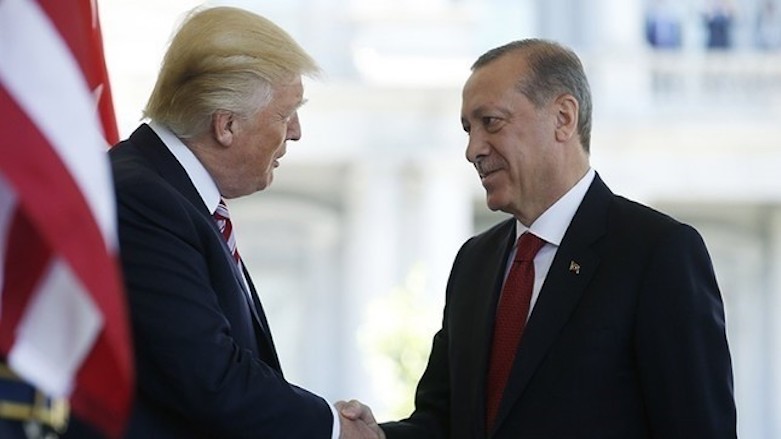Trump warns Erdogan of US concerns in Afrin, including expanded conflict

WASHINGTON DC, United States (Kurdistan 24) – US President Donald Trump conveyed to Turkish President Recep Tayyip Erdogan increasing US concern about Turkey’s assault on Syrian Kurdistan (Rojava), as the two leaders spoke by telephone on Wednesday.
The White House summary of the call explained that Trump had “urged Turkey to exercise caution [and] avoid any action that might risk conflict between Turkish and American forces.”
Trump also told Erdogan about US concern regarding the “escalating violence in Afrin” and called on Turkey to “deescalate, limit its military actions, and avoid civilian casualties.”
There are no US forces in Afrin, however, and Trump’s warning about a potential clash between US and Turkish troops appears to be aimed at Turkish threats to extend their assault further east to Manbij where US advisers are embedded with the Kurdish-led Syrian Democratic Forces (SDF), the main US ally in the war against the Islamic State (IS) in Syria.
Trump’s warning also signals a US intent to remain in Manbij and territory yet further east. As the Turkish assault on Afrin began, Russian forces withdrew from that area. However, Trump has indicated that will not be the case with US forces.
On Tuesday, the well-connected Washington Post columnist David Ignatius warned that the US alliance with Turkey was “dangerously near the breaking point.”
The “flashpoint” is Manbij, Ignatius explained, citing a senior administration official who told him, “Threats to our forces are not something we can accept.”
Erdogan has said that he intends to “foil games along our borders starting from Manbij.” Thus, it would seem that either he or Trump must back down if a conflict between the two NATO allies is to be avoided.
Trump also expressed his concern “about destructive and false rhetoric coming from Turkey” and the arrest of “US citizens and local employees detained under the prolonged State of Emergency,” which was imposed after the failed military coup in July 2016.
Despite Trump’s extremely strong language, he also, apparently, sought to highlight areas of common interest.
Trump “invited closer bilateral cooperation to address Turkey’s legitimate security concerns.”
To judge from the White House account, it seems Erdogan was receptive, as “the two leaders pledged to improve the strategic partnership” between the US and Turkey, “particularly in fostering regional stability and combating terrorism in all its forms, including [IS], the Kurdistan Workers’ Party (PKK), al-Qaeda, and Iranian-sponsored terrorism.”
Iranian-backed terrorism is a major concern of the Trump administration, which has designated Iran’s Islamic Revolutionary Guard Corps (IRGC) a terrorist organization. However, it has not been a major Turkish concern.
Editing by Karzan Sulaivany
